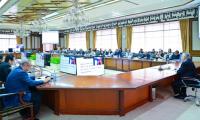WASHINGTON: The US Justice Department Thursday indicted seven agents of Russia´s GRU military intelligence agency as part of a joint crackdown with Western allies on a series of major hacking plots attributed to Moscow.
The indictments were announced as Dutch security services said they had thwarted a cyber attack on the global chemical weapons watchdog, the OPCW, expelling four Russian agents, and after Britain and Australia blamed the GRU for plots that notably targeted the US Democratic Party and global sports bodies.
John Demers, US Assistant Attorney General for National Security, confirmed the seven agents were indicted in connection with the attack on the OPCW, on football´s governing body FIFA and the US and global anti-doping agencies, and on the US nuclear energy company Westinghouse among others.
The indictments also include charges of money laundering, using virtual currencies like bitcoin, wire fraud and identify theft. "Nations like Russia and others that engage in malicious and norm-shattering cyber and influence activities should understand the continuing and steadfast resolve of the United States and its allies to prevent, disrupt and deter such unaccountable conduct," Demers told a news conference.
"The defendants in this case should know that justice is very patient, its reach is long and its memory is even longer," he said. The defendants, all Russian nationals and residents, were named as Aleksei Sergeyevich Morenets, 41, Evgenii Mikhaylovich, Serebriakov, 37, Ivan Sergeyevich Yermakov, 32, Artem Andreyevich Malyshev, 30, and Dmitriy Sergeyevich Badin, 27, and Oleg Mikhaylovich Sotnikov, 46, and Alexey Valerevich Minin, 46.
While the latest case did not arise from Robert Mueller´s probe into Russian election meddling, it overlaps with it. Yermakov, Malyshev, and Badin were among the 12 GRU officers indicted in July this year by Mueller, over alleged interference in the US polls in 2016.
Demers said the operations, dating back to 2014, "involved sophisticated, persistent and unauthorised access into the victims´ computer networks for the purpose of stealing private or otherwise sensitive information."
Russian President Vladimir Putin has repeatedly and angrily rejected similar charges, and Russia´s foreign ministry spokeswoman Maria Zakharova, reacting to the British and Australian claims, that the allegations had been mixed together "indiscriminately."
Nato chief Jens Stoltenberg separately warned Russia to halt its "reckless" behaviour. Canada confirmed Thursday it believes itself to have been targeted by Russian cyber attacks, citing breaches at its centre for ethics in sports and at the Montreal-based World Anti-Doping Agency (WADA).
"The government of Canada assesses with high confidence that the Russian military´s intelligence arm, the GRU, was responsible" for these cyber attacks, the foreign ministry said in a statement.
GRU stands for the Main Intelligence Directorate, Russia´s military intelligence agency which is one of Moscow´s three spy agencies along with the FSB security service and the SVR foreign intelligence agency.
Pakistan faces terrorist threat from outside, Maleeha tells UN
Ag APP
UNITED NATIONS: Pakistan has successfully dislodged terrorist sanctuaries from its territory, but now the principal threat is coming from beyond the country's borders, Ambassador Maleeha Lodhi has told a United Nations committee.
Speaking in the General Assembly's Sixth (Legal) Committee on Wednesday, she said Pakistan was combating the challenge from abroad by implementing a comprehensive border management system along its western border.
"Terrorists and their evil acts have never shaken my country’s resolve and determination to continue the fight to defeat it," Ambassador Lodhi, Pakistan's permanent representative to the UN, said in a debate on terrorism.
"The hard-earned stability that Pakistan enjoys today has been attained through a comprehensive approach against terrorism," she added.
Elaborating on the implementation of the border management system, Ambassador Lodhi said it would enable Pakistan to prevent the cross border movement of militants, stop the illegal smuggling of arms and check illicit drug trafficking while at the same time facilitate trade through improved border crossing facilities.
Also, she said no terrorist movement could be defeated by military means alone. On its part, Pakistan was following a "whole Society approach", engaging community leaders, developing strong counter-narratives, enhanced regional cooperation and following international obligations.
In her remarks, Ambassador Lodhi also underscored the need for addressing the root causes of terrorism, including well-acknowledged drivers of radicalization, which lie in political injustice, economic and social marginalization and exclusion and the breeding grounds spawned by long festering and protracted conflicts.
"Chronic instability due to conflicts and military interventions has provided fertile ground to terrorists to recruit followers and spread their ideology," she said, adding, "Terrorists and their supporters are obviously able to find save havens in ungoverned conflict areas," she said.
While the United Nations is focusing on improving technical measures, Pakistan firmly believes that the extremist ideology would never be defeated "unless we deal with the geopolitical dynamics which fuel terrorism."
Pakistan, she said, backed the Organization of Islamic Cooperation (OIC) position on a consensus-based Comprehensive Convention on International Terrorism (CCIT). The proposed Convention must be consistent with International Humanitarian Law and clearly differentiate between acts of terrorism and the legitimate struggles for self-determination of people living under foreign occupation.
"The malicious attempts by those who seek to manipulate the international consensus against terrorism to justify the suppression of people struggling for their right to self-determination must never be permitted to succeed," Ambassador Lodhi told delegates from around the world.
"Without a holistic approach, we will be fighting only the symptoms and not the underlying causes of this deadly phenomenon."
The United Nations, the Pakistani envoy said, enjoyed a unique position to build consensus among member states to deal with the diverse challenges posed by terrorism and extremism. However, the capacity-building structure of the United Nations was increasingly donor-driven and does not cater adequately to the needs of member states.







